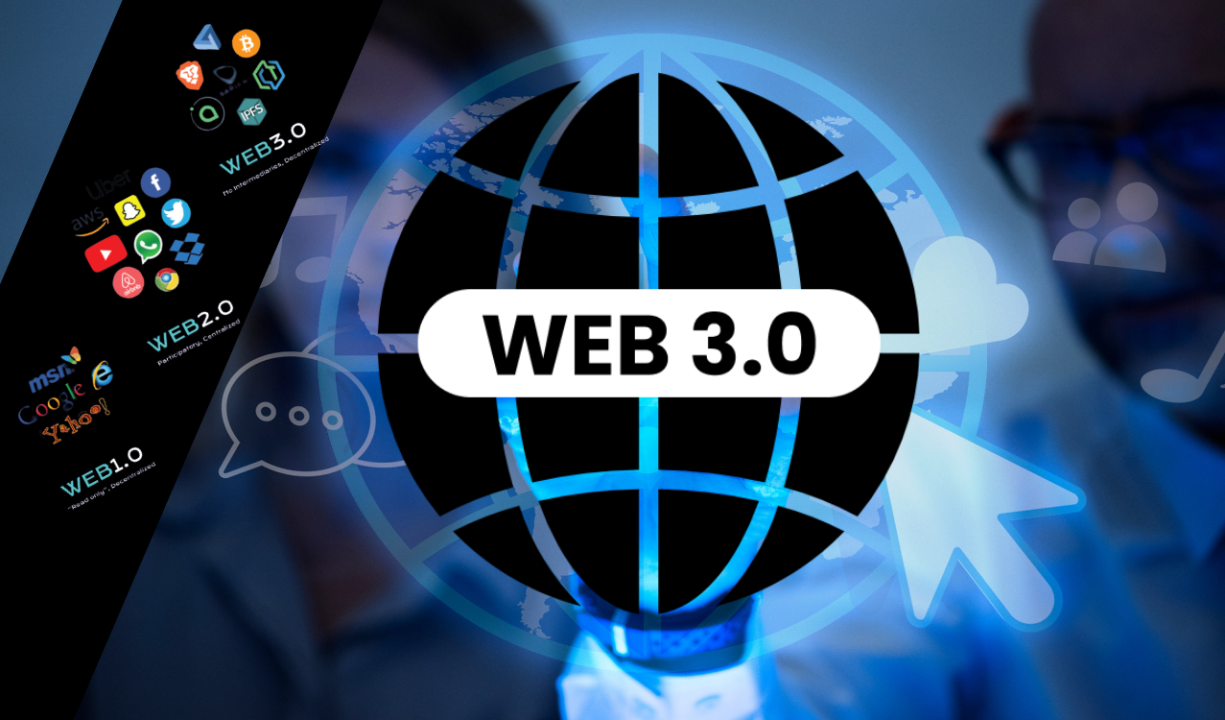
We got used to being a commodity as long as services like Facebook are free. But the dawning Web 3.0 era is about to revolutionize today’s internet, and hopefully put us back in control of our data and identity.
We each sit on our own small oil field, which is our personal data. Data economy is predicted to reach over €550 billion by 2025 in the European Union alone. The five largest world corporations - Apple, Amazon, Google, Meta, and Microsoft - are all actors in the data economy.
Web 3.0 is about to disrupt the way the internet works. At the moment, it heavily relies on data sharing - when we interact with different websites and applications, they collect specific data about us, which is later used to tailor feeds and ads according to our interests.
Web 3.0 comes with a promise to put us back in control of our data, preserve privacy, and even let us earn from sharing some of our personal information. But with big tech firmly holding the grip of the internet and us being so used to free internet that privacy isn't that much of a concern, can Web 3.0 take over Web 2.0?
What is Web 3.0, anyways?

Web 3.0 is a blockchain-based layer that sits on the top of the current internet. At the moment, companies like Google control vast pools of data. Whenever we ask for a service, our data is sent to its provider, and we lose control over it. Companies manage it on their servers.
Not only can those servers be hacked, but big companies also engage in data brokerage - they trade our data with third parties without our explicit permission. For example, Cambridge Analytica harvested tens of millions of Facebook users' data (presumably 87 million people might have been affected) without their consent, and later used that data for political advertising. This scandal pushed activists like Brittany Kaiser to advocate for our right to privacy.
In the light of massive data leaks, when such entities fail to protect the data they store, the public concern about privacy is growing. Recently, start-ups have been popping up worldwide to address it. They are mainly developing their solutions on Web 3.0, where data is being managed in a decentralized manner - data is cut into pieces and distributed among the different nodes of the network.
That way, it is more secure than the current internet. What is more, it is trustless and doesn't rely on any central authority, meaning that participants can interact without going through an intermediary. It is also permissionless - everyone can participate without authorization.
Can I use it already?
Web 3.0 is not the future - it’s already here. Although, it hasn’t taken over yet. The foundations of this new internet are being laid by various blockchain projects that respect our right to privacy and recognize that our data is our treasure, and we deserve to get paid when someone else makes money off of it.
For example, Partisia Blockchain, a Web 3.0 public blockchain, has partnered with Insights Network, a market research firm, to launch Instars, a decentralized and privacy-focused social media platform.
Projects like Permission.io and ImagineBC built on blockchain are laying the foundations for Web 3.0, where consumers will be able to preserve their privacy and earn money. If an advertiser wants to target you, they will need your explicit consent. Meanwhile, you will get paid for either watching content specially tailored for you, or sharing your, let's say, phone number for an advertiser to connect.
Decentralized identity is another excellent use case of Web 3.0. You have different identities for different services you sign up for, whether it's just another social media account or a hospital chart. You have little control over the data you provide to a specific institution. You receive credentials from the issuers and store them on your digital wallet with a decentralized identity. You can then identify yourself without actually giving away any personal information. For example, instead of knowing your date of birth, a liquor store you shop in just knows if you are of age.
Non-fungible tokens (NFTs) are another example of how we can benefit from Web 3.0. Musicians can mint and sell their songs as NFTs instead of giving away the lion's share of their earnings to their producers or streaming giants like Spotify. NFTs also function as entry cards to the exclusive online clubs, such as the Gutter Cat Gang.
Companies like Sandbox are building a metaverse on blockchain technology. We also might witness a change in how organizations are managed as DAOs (decentralized autonomous organizations) pop up. In DAOs, every employee is given a token to vote in the decision-making process, relieving the CEOs of their power.
Do we want that change?
While we may be excited about what the future holds, we are still somehow using Facebook after being infuriated by how it treats our data, handles misinformation, and exercises censorship.
By now, we have gotten used to being a commodity. Curiously, a report by an insurance company, Breeze, revealed that Americans are open to enterprises tracking their Fitbits, grocery receipts, and much more for cheaper insurance.
If we want to move the internet forwards, we must be the ones driving the world towards more privacy-preserving tech, like Brendan Eich, Co-Founder and CEO of Brave Software, once told CyberNews.
"I'm actually more in favor of consumers, the users who always jump on the next thing, whether it's cool technology or privacy-preserving technology, or both. Those users can move markets. If you look at regulators, they often seem to be looking into the past to decide what to do about the future, or worse, they get captured by the industry they regulate. That happens all the time. That's an unsolved problem in our society," he said.
Faster or slower, we will inevitably move to Web 3.0. Ryan Boder, DAO Core Team Lead at API3, says that while still young, Web 3.0 has reached critical mass. As the benefits to both consumers and businesses are apparent, the large technology companies have already begun to figure out how to incorporate it.
"Facebook changing to Meta is the first major example of big tech companies embracing Web 3.0. There will be other projects, names we may not have heard, as well that find their footing in blockchain, and that competitive force will also spur the traditional firms to work with this nascent technology," he said.
Boder thinks that, as with any new technology, at the start, there will be hiccups with Web 3.0, such as projects that look promising but don't pan out or even corrupt actors who exploit its newness for personal gain.
"Blockchain technology involves tradeoffs. In exchange for the increased transparency and immutability it offers, there are the costs of sometimes unpredictable transaction fees and the additional time imposed by its decentralized consensus structures. Entrepreneurs will certainly have to balance these concerns depending on their objectives," he added.
Anyhow, Web 3.0 represents a technology that will shape a generation and transform the way we work, earn money, interact with each other, transact, and govern organizations.


.jpg)


